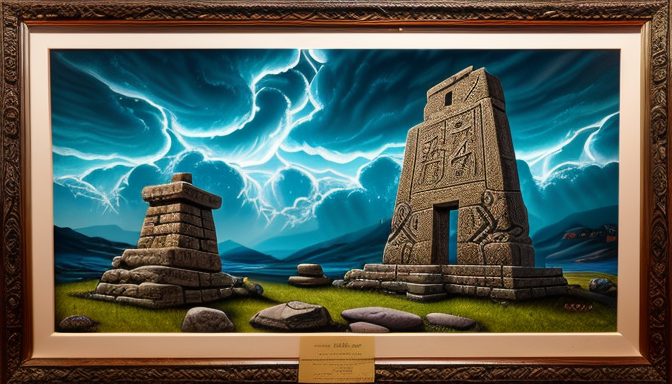Myths have always been the lifeblood of cultures, weaving together the fabric of societies and providing a mirror to humanity’s deepest fears and aspirations. From the ancient tales of gods and heroes to the modern interpretations that grace our screens today, these narratives have undergone a remarkable transformation. Have you ever wondered how a simple story can evolve into a complex tapestry of beliefs and values? That’s the magic of mythology!
Take, for instance, the pantheons of ancient civilizations. The Greeks had their Olympian gods, each representing various aspects of life, while the Egyptians revered deities that governed the afterlife, nature, and order. These myths were not just entertaining tales; they were essential for explaining the unexplainable. Consider how ancient people looked at the stars and crafted stories around them—constellations became heroes and monsters, guiding sailors and inspiring poets.
As societies evolved, so did their myths. In today’s world, we see echoes of these ancient stories in popular culture. Movies, books, and art continue to draw from these rich traditions, creating a bridge between the past and present. For example, the heroic journey of characters in modern cinema often mirrors the epic quests of legendary figures from mythology. This connection not only entertains us but also helps us explore our own human experiences.
Ultimately, myths are more than just stories; they are a reflection of our collective consciousness. They allow us to navigate the complexities of life, offering insights into our values, fears, and dreams. So, the next time you dive into a myth, remember—you’re not just reading a story; you’re engaging with the very essence of what it means to be human.
The Origins of Mythology
Understanding the beginnings of mythology reveals how ancient cultures crafted stories to explain the unexplainable. Imagine living in a time when thunder was not just a sound, but the roar of a mighty god expressing his anger. These narratives were more than mere tales; they were the very fabric of society, shaping beliefs, values, and traditions across civilizations. From the Greek pantheon with its vibrant deities like Zeus and Athena to the rich stories of the Hindu epics such as the Mahabharata, myths served as a lens through which people interpreted their world.
In the cradle of civilization, myths provided answers to profound questions: Why does the sun rise? What happens after death? These stories often featured larger-than-life characters, heroic journeys, and moral lessons that transcended time. For instance, consider the myth of Prometheus, who stole fire from the gods to give to humanity. This tale not only illustrates the struggle against divine authority but also emphasizes the value of knowledge and the consequences of defiance.
As we delve deeper into these ancient narratives, it’s fascinating to see how they laid the groundwork for modern storytelling. Many contemporary literary works and films draw inspiration from these age-old tales, weaving them into new contexts. Whether it’s the epic battles of gods or the moral dilemmas faced by heroes, the echoes of ancient myths continue to resonate in our lives today.

The Role of Myths in Modern Society
In today’s fast-paced world, the role of myths remains as vital as it was in ancient times. These timeless tales serve as a bridge connecting us to our roots, offering insight into the human experience. Ever wondered how a simple story can shape our understanding of life? Myths encapsulate the essence of our fears, dreams, and aspirations, reflecting the cultural values of the societies that birthed them.
Take a moment to think about your favorite movies or books. Many of them draw upon ancient myths and archetypes, weaving them into their narratives. For example, the classic hero’s journey, seen in stories from Homer’s Odyssey to modern blockbusters like Star Wars, illustrates universal themes of struggle, growth, and triumph. These narratives resonate deeply with us, as they echo our own life challenges and victories.
Moreover, myths have adapted to fit modern contexts, reflecting contemporary issues such as identity, technology, and morality. They not only entertain but also provoke thought and discussion. In a world filled with chaos, myths provide a sense of order and meaning. By exploring ancient myths and pantheons, we can immerse ourselves in fictional worlds that offer deeper narrative immersion, allowing us to explore our own beliefs and values.
In conclusion, myths are not just relics of the past; they are living stories that continue to shape our understanding of ourselves and the world around us. They remind us of our shared humanity and the timeless struggles we all face, making them an essential part of modern society.
Frequently Asked Questions
- What are the origins of mythology?
Mythology traces back to ancient cultures where stories were crafted to explain everything from natural phenomena to human behavior. These tales served as a way to make sense of the world, laying the foundation for future narratives across civilizations.
- How have myths evolved over time?
Myths have continuously transformed, adapting to cultural shifts and societal values. As civilizations change, so do their stories, reflecting the collective experiences and beliefs of the people within them.
- What role do myths play in modern society?
In today’s world, myths still hold significant influence in literature, film, and art. They help us connect with shared human experiences and offer a lens through which we interpret our current reality, bridging the gap between past and present.
- Why are myths important to understand?
Understanding myths is crucial because they reveal the cultural and historical context of societies. They reflect our fears, hopes, and values, providing insight into human nature that transcends time and geography.

Recent Comments